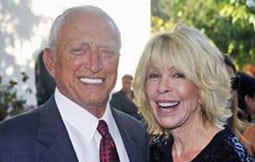The passing of Ben Bradlee, famed editor of the Washington Post, leaves me (saddened and alone) in a cinema of the mind, where the radiant light and mechanical sound of a film-in-progress shows Jason Robards (as Bradlee) in All the President's Men.
His look – nothing more than the upward focus of his eyes towards Dustin Hoffman (as Carl Bernstein) – makes his own subsequent words, to one half of this reportorial duo, superfluous: “Get some harder information next time.”
That is leadership. It is the combination of charisma, authority and respect, which requires no pulling of rank – Robards's Bradlee wears no medals or epaulets, though his Gucci loafers are a nice touch – and shouting save a few protestations from the chroniclers of Watergate.
The point is: Leaders speak by virtue of their respective deeds; they only yell at injustice, not at subordinates, who absorb these manic fits of rage with nary a word of complaint.
Call it wisdom or class or manners, or all three, but, in thinking of Ben Bradlee, who was a close friend of John F. Kennedy, I write the following as a form of free association or stream of consciousness regarding leadership.
Specifically, I recall Jimmy Breslin's article about the surgeons at Parkland Memorial Hospital in Dallas, who rushed to treat their mortally wounded president. In that awful tragedy, during those minutes when multiple doctors (and one surgeon in particular) tried to resuscitate their commander-in-chief, to revive his lungs and massage his heart; the entirety of that moment lives, and here I bear witness to the trauma a surgeon sees, as a testament of leadership.
It is a tribute to the doctors and nurses themselves, and a symbol of the simultaneous transference of the president's spirit unto his wife and the ascension of his soul.
Again, the eyes speak; they are lights of stoicism and resolve. They are unmistakable beneath a thin black veil of Swiss lace. They encapsulate a thousand days of presidential leadership into a single day of grief.
Let the word go forth from this time and place, to friend and foe alike, that the torch has been passed to a new generation of Americans – born in this century, tempered by war, disciplined by a hard and bitter peace, proud of our ancient heritage – and unwilling to witness or permit the slow undoing of those human rights to which this nation has always been committed, and to which we are committed today at home and around the world.
A Human Camera: Images About Context and Sheltered Memories
I am no stranger to the eyes of a grieving widow, as I am one myself; and I am no mere stenographer of what a surgeon sees, as my late husband, Dr. Richard Grossman, has a legacy that shall forever remain visible.
Through his eyes, as blue as the Hawaiian water of the Pacific, Richard's leadership prevails. Those eyes – the look of an unofficial fraternal order of healers – see pain, and try to stop it; see worry, and try to soothe it; and see hardship, and try to comfort it.
Scores of children also remember those eyes: They saw that look – The Look – that brought them from impoverished villages and the provinces of warlords to freedom in America; where, because of the physical burns they sustained from the conflagration of primitive kerosene lamps and ancient cook stoves, Richard's eyes made them whole – from charred flesh to skin grafts; from disfigurement to beauty.
His eyes are the first things I see in the morning and the last stars I observe at night, where Richard says, “It will be okay.” And so it is.
The only other man with such eyes, a genius I had the pleasure to work for, is George Soros.
Those eyes record the evil of men, the invasion of the SS and the subsequent occupation of the Red Army. Those pupils remember the flag-bedecked boulevards of Budapest, where Hitler's swastika cast its shadow on old cobblestones, to be followed by the long darkness of Stalin's hammer and sickle.
This perversion of everything decent – the eyes cannot forget the abyss of tyranny.
The eyes also breed a sense of calm because, when you have seen the worst of history and the depravity of sadists-deputized-as-ministers-of-justice, you have an appreciation of context.
Calmness is a leader's habit.
It pervades the newsroom, the operating room and the trading floor.
It is in the eyes for all of us to see.
—
A Board Member of the Dr. Richard Grossman Community Foundation, Elizabeth Rice Grossman retired from a 35-year career on Wall Street, the last eight as a Managing Director of Soros Fund Management in charge of worldwide trading. While living in New York, she served on the Board of the Ronald McDonald House, The Family Academy and was a Trustee of the Public Theater. Upon retirement, she moved home to San Francisco, and became active in her Community. She is a member of the Board of Trustees of the Honolulu Museum of Art and Chairs the Investment Committee. She also serves on the Board of the Hawaii Community Foundation as well as the Hawaiian Human Society.

